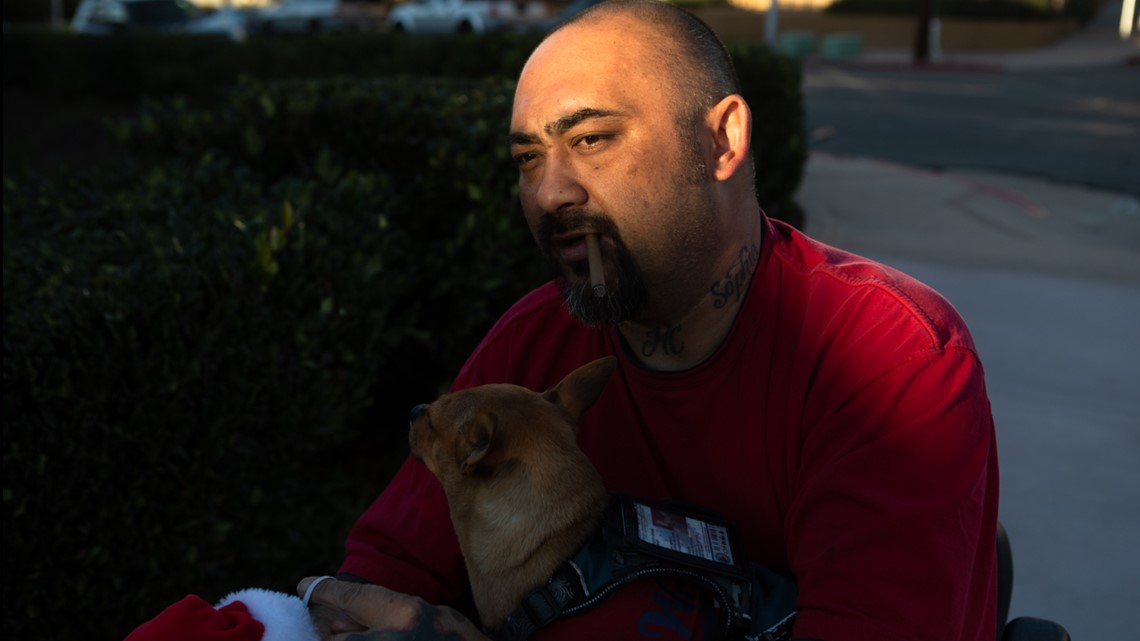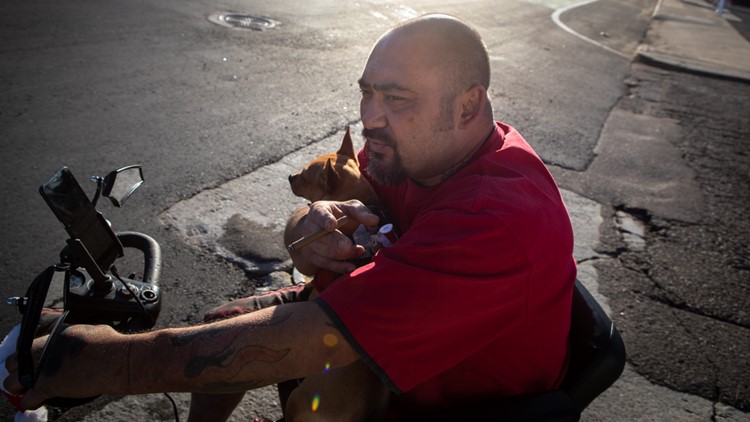SAN DIEGO — San Diego County will stop using hotels as COVID-19 shelters by March 31 — more than two years after the troubled program began isolating people with nowhere else to go — because the federal money used to pay for it is expected to run out, said Housing Director David Estrella.
Costing at least $5.2 million a month, the hotel program is the first of its kind and has been praised for its success in preventing the spread of COVID-19. But inewsource reporting over the past 18 months has revealed mismanagement, neglect and harassment of guests staying at the hotels.
Estrella said the plan is to connect the remaining residents with other housing options by the end of March, sending people to a homeless shelter as a last resort. Officials have already given nearly 100 emergency housing vouchers to people who are at risk of homelessness.
Chris VonKroog, one of the hotel guests who received a voucher, worries about where he’ll wind up. He said while the voucher gives him financial support, it does nothing for his credit, and health issues prevent him from going to a homeless shelter.
“I don’t think I’m going to find housing in time,” VonKroog said. “I’m going to be literally right back out on the street with my dog.”
In March 2020, county officials took over the Crowne Plaza in Mission Valley and other hotels to temporarily house people who needed somewhere to isolate — many of whom are homeless and might be struggling with mental illness or substance use disorders. All told, the program has served roughly 13,700 people, Estrella said.
With data, documents and multiple interviews, inewsource exposed an array of problems at the hotels, which was later confirmed by a blistering evaluation released by San Diego State University in August. The evaluation also said the county’s contractor, Equus Workforce Solutions, is unqualified to run the program and employs poorly trained staff, who forced residents to suffer through long delays for much-needed medication and who allowed gaps in services that may have led to overdoses and suicide.
At least seven people have died in the program, according to records obtained from the Medical Examiner’s Office. Five deaths have been linked to overdoses.
On Dec. 3, the county extended its $140.6 million contract with Equus to last through the end of March, effectively ending the program.
“As vaccination rates have increased and positive cases decreased, so has the need for this critical service,” Estrella told the Board of Supervisors on Dec. 7.
But as county officials prepare to close a program that was intended to keep vulnerable people safe, the Omicron variant has begun spreading locally and the vast majority of the county is facing “high” or “substantial” COVID-19 transmission rates.
County officials did not answer a question about the timing of this decision, saying only that occupancy at the hotels has decreased and they will continue to monitor that as they have throughout the pandemic.
But pulling the plug on this public health initiative could be a big mistake that spells disaster for vulnerable populations, said Sanghyuk Shin, a University of California Irvine epidemiologist and public health expert.
“We really need to expand those types of services ASAP to really prevent a huge surge and overrunning of the hospitals,” he said, adding that homeless shelters “are just ripe for superspreading events.”
Omicron has shown an ability to dodge defenses, such as vaccination or prior infection, allowing it to spread quickly and widely even in populations with high levels of prior immunity, Shin added. He expects the new variant to take root in the next few weeks, causing an exponential increase of cases, and warned against the false sense of security that vaccines will help bring us back to normalcy.
“Vaccines are fantastic and they work really well in many ways,” Shin said, “but they’re clearly not a silver bullet and unfortunately other measures really need to be in place to maximize the effectiveness of these vaccines at the population level.”
Transition plan
The hotel program has two components: Isolation and high-risk hotels.
People who come in contact with the coronavirus and have nowhere to quarantine — including first responders who needed to be away from family, as well as people without housing — were sent to an isolation hotel. Unhoused people who have underlying medical conditions were given a room in a high-risk hotel. Some have been living there for a year or longer.
At its peak, the hotel program was serving more than 1,100 people in September, Estrella said. Many of them were asylum seekers who tested positive for COVID-19 while in federal custody and were sent to an isolation hotel to quarantine, a county spokesperson has said.
That same month, the state established its own isolation hotel to serve migrants, Estrella said. Since then, the number of people staying in the county hotels has dropped steadily. Today, one isolation hotel serves between 100 and 150 people any given night, he added. Officials haven’t said how many people are staying in the high-risk hotels.
The county has been relying on money from the Federal Emergency Management Agency to pay for the program, but officials anticipate the reimbursements will end April 1. For that reason, coupled with the reduced need for services, Estrella said the county will end the program and vacate the hotels by the end of March.
Officials will stop taking referrals to the hotel program March 1, causing the isolation hotel to naturally ramp down as people complete their quarantine period. Staff will assist guests staying in the high-risk hotels with other options, Estrella added, such as connecting them with family or other support systems, helping them into another program called rapid re-housing, or giving them a voucher. If all else fails, Estrella said staff will send people to a long-term shelter through city partners and the Regional Task Force on Homelessness.
But some tenants are afraid they will fall through the cracks.
‘I don’t know what I’m going to do’
VonKroog said he and his 4-year-old service dog, a Chihuahua mix named Bobo, have been living in one of the high-risk hotels in Old Town since January. Prior to that, they were sleeping in his car in one of San Diego’s safe parking lots. He no longer has the car.


“I have my voucher and it sounds great and wonderful, but now I have to find a place,” VonKroog said, “and I have to find a place based off credit, which … is absolutely horrible now.”
He said he has a lead on a 55-and-older community for disabled residents — a motorcycle accident from 2018 has caused him to rely on an electric scooter for mobility — but if that falls through, he’s already thinking about having to sleep under a bridge on rainy days.
And until then, he said he will have to continue putting up with constant harassment and ableism from staff and security at the hotel.
“The worst part is how I’ve been made to feel. I’ve literally been in tears. I’ve been made to feel just absolutely horrible,” VonKroog said.
He echoed sentiments expressed from residents and others surveyed during SDSU’s independent review that staff members “steal from you, they treat you like you’re nothing, and then when you try to put in any kind of complaint, it goes nowhere.”
An Equus representative did not respond to a request for comment.
Linda McDowell and her 5-year-old pitbull named Stella have been at the same hotel since January. Life there has been difficult, she said. Records show the county’s contractor has attempted to kick her out of the room at least once, and she has filed a temporary restraining order against one of the staff members for harassment.
But McDowell is still there and hoping she’ll find a place to stay come April 1. She said case managers seem to be doing what they can — making calls on her behalf and keeping in regular contact — but nothing has come through.
Meanwhile, guests around her are receiving vouchers or other forms of assistance. She worries what her future holds because she doesn’t have anything to fall back on, except for her 2018 SUV.
“I don’t know what I’m going to do,” she said, adding that she is depressed. “I don’t have any opportunities or family to go to, so it would be back in my car and that’s a concern because you can’t cook, you can’t shower. I mean, it’s going to be hard.”
Jill Castellano contributed to this report.
inewsource is a nonprofit, independently funded newsroom that produces impactful investigative and accountability journalism in San Diego County. Learn more at inewsource.org.



